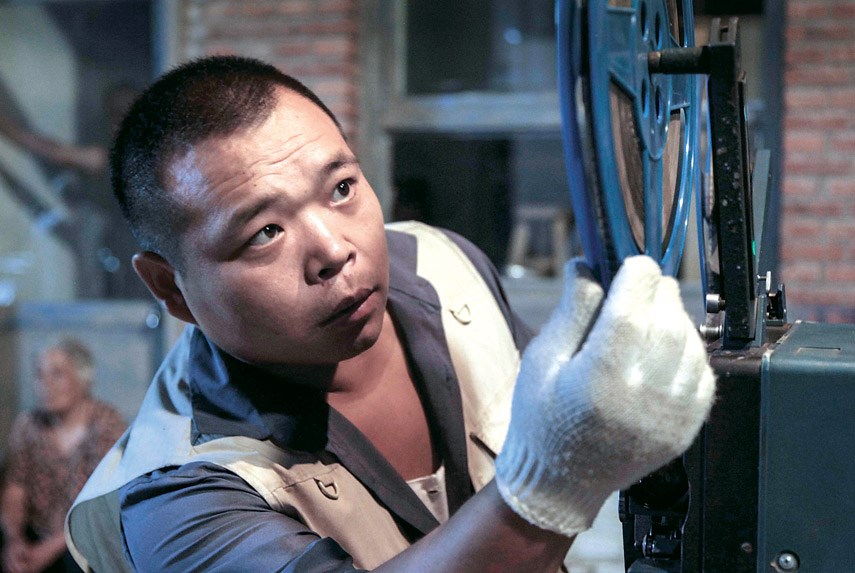King of Peking. Directed by Sam Voutas (China/Australia/USA 2017). Screening at the Vancouver International Film Festival. Visit viff.org for showtimes.
There’s a movie tonight!
Not just any movie, this one’s a Hollywood blockbuster! This Sunday only!
King of Pekingbegins with a boy named Little Wong racing down dusty city streets, shouting promises of adventure and excitement at the behest of his projectionist father, Big Wong.
Popcorn pops over a fire, seats shuffle, the screen is fastened to resist the wind. Director Sam Voutas’ camera lingers over Big Wong’s film projector the way George Miller’s camera lingers over a car engine or Pedro Almodovar’s camera lingers over Penelope Cruz.
Silence draws over the crowd . . . the show is about to start.
But like the gunfighter or the samurai, the era of the projectionist is ending. And when Big Wong needs a great sum of money to keep custody of his son he leaps from projectionist to DVD pirate.
King of Pekingis a movie for people who love movies but it’s more cautionary tale than cinematic sonnet. Probably because it was inspired by Voutas getting ripped off.
The writer/director/editor had just released his first feature film, a comedy about a sex shop proprietor called Red Light Revolution when he was offered the chance to buy the film from a DVD stand in China.
“We were pirated,” he confirms.
Instead of inciting Lars Ulrichean wrath against infringement, Voutas found himself thinking about the bootleg stands that were ubiquitous during the now vanished DVD era, imagining “underground pirates” who fashioned themselves as producers, studio heads, moguls.
“Rather than get angry,” he reasoned, “what I can do is make a movie about it.”
While Voutas grew up in Australia (he adds an R when he pronounces China) much of his childhood was spent in China, and those memories are scattered through the movie, along with a lifetime of movie references.
There’s Lethal Weapon and 2001: A Space Odyssey, there’s the theme from The Sting (you might argue the song is called “The Entertainer,” but in this movie it’s the theme from The Sting).
At its core, however, King of Peking is about a father and son.
We like Big Wong when we meet him. He’s a snake-bit charmer, confident the next reptile will be the one he can captivate.
“Our son working here is child labour,” his ex-wife accuses.
“It’s not child labour if he’s not getting paid,” he replies.
We don’t like his ex-wife. But the more we learn about Big Wong, the less surprised we are he’s divorced. The shocker is that he was ever married.
Big Wong drives a car that looks like the world’s least recreational vehicle; a shed attached to a motorcycle. It’s a car in the same way Wong is an adult: barely.
But his son rides alongside his father without complaint, even when they’re not going where he wants to go
“This is very much a movie about a father (where) his own dreams are the most important,” Voutas says.
The plot recalls Vittorio De Sica’s classic Bicycle Thieves.
“We ended up having varied styles because the movie is about cinema,” Voutas explains.
Some frames echo De Sica while the handheld camera is a nod to Jean-Luc Godard.
But the references deepen when Big Wong reminisces about European cinema.
“I thought Italy and France were all black and white,” he says. “Who knew they lived in colour?”
That type of nuance is one of the elements VIFF programmer Shelly Kraicer looks for in choosing the fest’s Chinese-language films.
He speaks excitedly about The Great Buddha as a portrait of life in Taiwan, The Hidden Sword as a funny swordfighting epic that deals with the soul of China.
Movies like those can change an audiences’ perception of China, he explains.
“Not just as a terrifying economic powerhouse – although that’s something to confront – not just as a country that represses its artist dissidents, although that’s obviously going on there.”
Instead, the movies show creative artists using all sorts of channels of express what’s right and wrong with China.
In King of Peking, the audience sees a version of China that’s vanished.
Much of the movie is set in a movie theatre two hours outside Beijing. It used to show propaganda movies, Voutas says.
He wanted to find a theatre in the city, “But so much has been destroyed in Beijing since the 1990s.”
“In a China where buildings are being destroyed and replaced by new buildings,” he says, “the cinema becomes your memories.”
We can almost imagine a little boy yelling that in the street.



